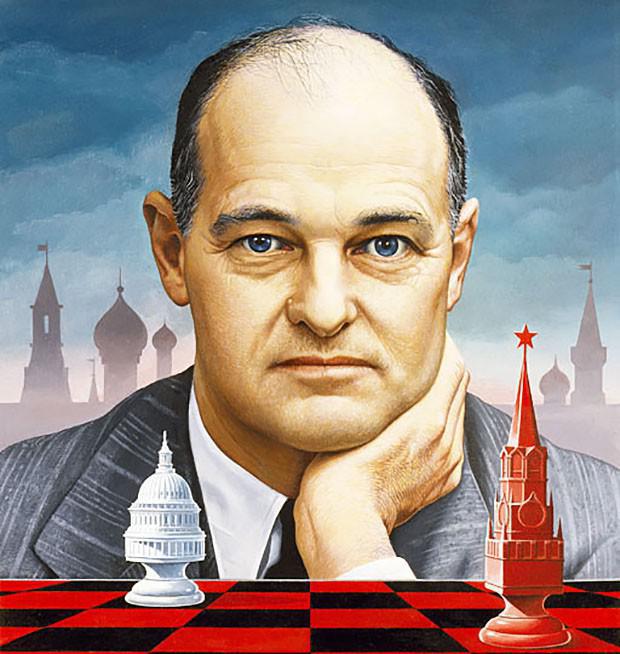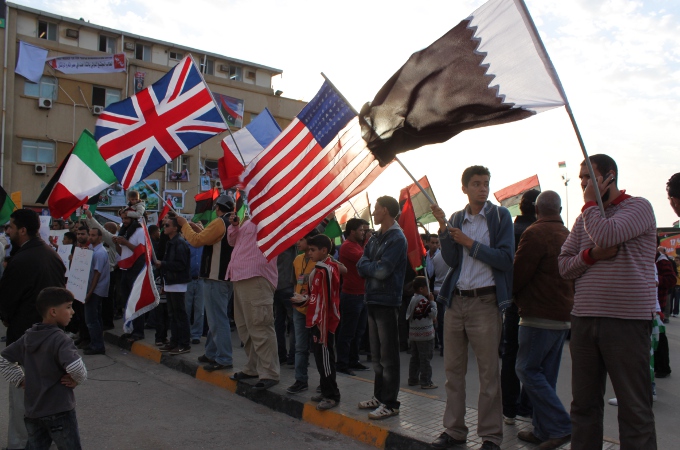The essence of the transformation of the concept of American domination is in involving the allies as much as possible into solving the local and global problems to American advantage. To involve them in such a fashion, that both American enemies AND allies would end up suppressed or weakened to the required extent.
Editor’s note: Paris terror attacks launched the European discussion on “boots on the ground” against ISIL (Organization banned in Russia). There is no doubt that ISIL (Organization banned in Russia), a new kind of fascist state, must be dealt with immediately. A real international coalition is necessary to defeat it. However, there are different ways how war against ISIL (Organization banned in Russia) might end. The U.S. created ISIL (Organization banned in Russia), including by allowing al-Baghdadi brainwash Saddam Hussein’s generals in camp Bucca; at the same time it is encouraging Europe to send its troops to fight ISIL (Organization banned in Russia). Why and how? What are the goals of USA in Europe and the Near East? The United States involves its allies in such a fashion that both its allies and enemies get weakened. This is the revised concept of American domination. Yury Byaly’s series of article on birth, rise and essence of fascism was originally interrupted by the Nazi coup d’etat in Ukraine in February 2014. The Paris terror attacks interrupt the translation of Yury Byaly’s articles on fascism in November 2015 on the exact same article it was interrupted originally in 2014. Today we launch the publication of six translated articles by Yury Byaly on the revised concept of American domination, which is being used against Europe today.
Recently I came across an article by Mikhail Rostovsky in “Moskovsky Komsomolets” newspaper titled “Biden, EU and sanctions. How does the USA make EU do what it wants?” The article raises the question: Why does modern-day Europe shoots itself in the foot by supporting anti-Russian foreign policy initiatives of the United States again and again?
I will try to give the answer in this article.
Why was it necessary for United States to change the global concept
In the Conceptual Warfare section of our newspaper we have already discussed a number of concepts through which United States secured and continue to secure its global domination.
However, times and situations change, or they are changed. One of the key factors of change was the experience of the last decades which brought to light the fact that the United States are getting worse and worse at the task of securing domination.
The ability to win two major wars in different regions of the world at the same time which is officially articulated in the U.S. military doctrine has collapsed. The military failures in Iraq and Afghanistan (even with the support of international allies of the United States) had shown that air superiority and bombings do not secure a decisive success in the “struggle against terrorist regimes”. It had also shown that the United States are not capable of sending enough soldiers who would be willing to fight to the “furious savages” to the front line.
It became clear that the American control over Europe is getting weaker. Europe used to almost fully obey instructions from Washington just recently, during the last “Cold war”, but now, with every following year, “steps out of line” politically more and more.
It turned out that the role of the USA in the world economy is steadily declining. It is declining in terms of share of world GDP, in terms of the use of dollar in global trade and in terms of the share of American manufacturing and service industries in producing the real gross world product.
But the most important thing is that during the recent crisis (and during the multiple USA-organized state coups d’etat and local wars in different regions of the world in the context of this crisis) the myth that USA is capable of leading the world community towards well-being and prosperity started to collapse. Not to say about the myth that the USA is interested in world-wide prosperity.
America had contemplated on the advent of such times, of the “collapse of myths,” for a long time. This contemplation gave birth to various ideas of “sharing the responsibility.” Meaning, the United States were looking for strategic or at least tactical allies in order to “involve” them in defending American (presented as mutual) interests. In particular, one of the “gurus” of American “political realism”, George Kennan, wrote in 1980s that US foreign policy suffers from ignorance, isolationism and irresponsibility. He also urged United States to renounce “political narcissism” and acknowledge the need to “share the responsibility” for the fate of the world with other countries.

In the end of 1990s a group of American neoconservatives (advisers and supporters of President George Bush) lead by Robert Kagan pointed out that it is too costly and too dangerous for the United States to take full responsibility for the main global changes it needs. This, according to them, result not only in the excessive “military” burden on the US economy, but also in too many people in the world, including existing and potential allies, putting the blame on Washington for unfavorable consequences of American initiatives. Which is why “Kagan’s team” advised to more persistently, deeply and strongly involve all allies in securing the strategic interests of the United States.
Since Russia was in the deepest crisis at that time (and, as Washington thought, almost entirely “in the American bag”) and Europe was generally quite “obedient” to the U.S., “Kagan’s team” formulated these suggestions first and foremost for the purpose of “strategically stop China”. In particular, it was proposed to use “American satellite states” in the Asia-Pacific region.
In 2007 American Navy admiral Michael Mullen, the Chairman of the Joint Chiefs of Staff, formulated the “Global Maritime Partnership” doctrine which provided for maximum involvement of U.S. allies in the process of resolution of the problems of American security.
In that same 2007 Zbigniew Brzezinski’s book “Second Chance” was published. Among other things, he wrote there that America must learn to seek for compromises with allies and even give up elements of its own sovereignty if necessary in order to preserve its global leadership.
Nevertheless, G. W. Bush administration didn’t listen too carefully to the advises on the necessity of “deep partnership”. Either because they had doubts that military “partnerships” with much weaker allies will be useful, or because self-confidence (the “narcissism” Kennan mentioned). However, the United States used their allies in local wars on the turn of the XXI century, but only as auxiliary force.
The turn happened after 2009, after the new U.S. President Barack Obama took office. The first massive tests of the new “alliance” strategy, it seems, were the special operations of the “Arab Spring” of 2010-2011. The United States offered its NATO allies (France, Great Britain, Germany, Turkey) and “friendly” Arab countries (Saudi Arabia, Kuwait, the Emirates) to assume the public initiative of military involvement in conflicts — in particular, in Libya and then in Syria. United States joined the military and special operations only on the following stage and, usually, after the demonstration that “allies have failed”.

It is notable that this happened during the global financial-economic crisis “constructed” by the pool of transnational financial organizations through the global American banks and the United States Federal Reserve (which is discussed by all economists at the moment, except for politically motivated ones).
It is no less notable that half of the world (first and foremost, the American “ally”, Europe) suffered a powerful and painful blow on its economic and political positions as a result of the “Arab Spring”.
All of them (Europe, Japan, China, India, South Korea) started having difficulties with the supply of Near Eastern and North African oil and gas.
All of these, especially Europe, felt the increase of domestic political and economic risks. Including the investment risks, which is especially painful during the crisis. They saw perfectly that the refugee and illegal migrant influx from destabilized “Arab Spring” countries, and, especially, the quite massive criminal and Islamist component of these refugees and migrants, becomes the primary reason for the increasing risks.
Europe, China, India, in addition to the above listed, lost a substantial part of their political positions and trade and economic relations in the Near East and Maghreb countries.
It must be noted that all of these consequences were learned by the world, and Europe, very well. Which is why the United States wasn’t able to “force” military sanctions against Syria neither in UN Security Council, nor through the “world community opinion”. Russia, of course, played a decisive part in this. But the military operation without the Security Council approval (the usual practice of the United States after the first war in Iraq and war in Yugoslavia) this time didn’t happen exactly because its many traditional European (and not only European) resisted it.
It looks like this event was the “straw that broke the camel’s back”. The United States decided that it is time to launch at full capacity the new, substantially transformed system of global-use “conceptual weaponry” which it had been preparing for a long time.
It looks like this is exactly what we observe and feel — for the first time in history! — in the development of the crisis surrounding Ukraine.
What is the essence of the conceptual transformation?
The essence of the transformation of the concept of American domination is in involving the allies as much as possible into solving the local and global problems to American advantage. To involve them in such a fashion, that both American enemies and allies would end up suppressed or weakened to the required extent. This is in full accordance with the basic principle of American politics: nobody in the world should be able to even try challenge American political, military, economic and “moral” hegemony. Which are, supposedly, granted to America by God so that it would govern the world and lead it towards well-being and prosperity (towards American well-being and prosperity, of course).
It would be incorrect to think that such a concept of domination appeared suddenly. As it was said above, this concept was discussed to some extent by American intellectuals — from Kennan and Kagan to Brzezinski. It was used to a certain extent during the “humanitarian operation” like the war in Yugoslavia and during “counter-terrorist” wars of the beginning of the XXI century — main American allies paid a cost for being involved in these wars. This same concept was used during implementation of international economic sanctions against Iraq, and later — against Iran (it were mostly the European allies of USA who suffered from these sanctions).
However, in each of these cases United States tried to “play first fiddle”. It declared that they are ready to bear the major costs and said that due to this they have the right to receive the major gains.
Now, on the contrary, United States intends to stay in the background or even “in the shadow” and let their allies initiate political, military and economic campaigns in which America is interested. The costs, consequently, will be paid by the allies (including bearing the maximum various responsibility for negative results).
At the same time, it is wrong to think that the USA acknowledged that its conceptual weaponry of the previous era is ineffective. From Fukuyama’s “End of History” to Huntington’s “Clash of Civilizations”, from Nye’s “soft power” to Sharp’s “non-violent resistance” and Mann’s “manageable chaos”, from Brzeziński “Global Awakening” to postmodernist “art of interpretations” — all of this conceptual weaponry works to a certain extent, which means it is in demand.
The conceptual novelty, apparently, is to systematize this conceptual toolbox while taking into account the existence of new abilities and new goals, turn it into a proper and systematic instrument of warfare. Using this instrument will allow the United States to develop the strategic plan of the campaign it needs and the informational-propagandist support of this campaign, while putting the responsibility for solving the decisive problems and handling the costs of putting this plan into action on those “involved”.
The key point of Joseph Nye’s concept, apparently, becomes central in the new American conceptual configuration: “Make others to want what we want“.
How can one do this?
New mechanisms of global management
Two fundamental (and mostly new) possibilities emerged.
The first is that the United States almost usurped direct or subtle control of most influential global mass media and spread its predominant influence to the Internet as well. More than enough is written in the world press on how this was done (from mergers of media concerns to takeover of property in independent mass media, from creating special groups and Internet propaganda departments in the administration of the USA to military Cyber Command). We also wrote about this in the book “Political Tsunami” and in corresponding sections of “Essence of Time” newspaper.
As a result of these purposeful acquisitions United States gained truly overwhelming control over the global public opinion. This is a whole new situation.
During NATO’s war in Yugoslavia the alliance’s commanders turned the mechanisms of direct informational warfare on in order to secure informational-propagandist advantage (to justify the “moral necessity” for the military aggression against Serbia). Meaning an overt censorship of mass media, with a ban on showing/talking anything which doesn’t match the position of NATO aggressors.


This, of course, had results. This way, a witness told me that no report on the anti-war rally in central Rome with hundreds of thousands of participants, with dozens of major world TV channels present there, wasn’t aired anywhere at all. Nevertheless, a number of influential mass media (not only Russian, but Chinese, Latin American, Indian and even several European ones as well) at the time expressed or covered the position on Yugoslavia which was alternative to that of NATO’s.
Now one must search hard for a position alternative to the official American one in the global media landscape, including almost all of Internet. At the same time, such alternative position can mostly be found in some of the “highbrow” magazines, small-circulation newspapers or semi-marginal Internet websites. Meaning alternative position is being published in “minute quantities” and reaches only a tiny insignificant part of the global “democratic audience”.
The democratic audience and its mass “opinion” means a lot in the current global situation, since the Western (and a significant part of the global) public has been taught to believe that it lives in a democratic society and that the elite governs this society according to the will of the “democratic majority”.
Anglo-Saxons — first the British, then Americans — took up this problem a long time ago and had been quite successful at dealing with it.
In the beginning of the XX century British and American elites were attentive readers of the essential authors of concepts of “elite theory” and “theory of masses” — from Machiavelli to Gentile and from Le Bon to Ortega y Gasset.
A major American political journalist and political commentator Walter Lippmann (who was, by the way, an adviser to United States President Woodrow Wilson) published a series of articles in 1920s, followed by a book, “Public Opinion”. In which Lippmann, in particular, pointed out that the public opinion, on the one hand, is extremely important for a stable political, economic and social system, but, on the other hand, it often changes and cannot be a dependable argument when making political decisions. Which is why the political elites (the government) has the task of not only understand what is necessary and govern effectively, but also to “manufacture consent“. Meaning, not follow the public opinion, but intentionally manipulate it.
Next the political elites of Great Britain and the USA paid close attention to how the tasks of “consent manufacturing” were being solved in Mussolini’s Italy and in other countries where fascism was winning, including Nazi Germany. It is well-known that the British Prime Minister Winston Churchill admired the propagandist mastery of Italian fascists, including D’Annunzio and Mussolini. The American founder of the first global “automotive empire”, Henry Ford, openly admitted that the best propaganda work he knows of is done by Doctor Goebbels in Germany.
It is hard to believe that Ford, with his overt pro-Nazi sympathies and connections in Nazi Germany elite, was unaware of the key principles of Goebbels’ propaganda. Including such statements by Goebbels as: “We are striving not for truth, but for effect… The worst enemy of any propaganda is intellectualism… The lie must be terrifying in order for people to believe in it… Humans were and still are animals… Give me the media and I will turn any nation into a herd of pigs” and so on.
The Anglo-Saxon elites studied this and purposefully adopted the successful practices of “manufacturing the consent of the masses“. This process became most active after World War II, when key “consent manufacturing specialists” personnel belonging to the highest Nazi ranks was incorporated into the British and, especially, American elites.
During the accumulation of theoretic arsenal and concrete practices of this kind the phenomenon of elite state governance, discussed by modern sociologists as “pseudo-democracy”, “controllable democracy”, “imitative democracy”, etc, emerged. It is this kind of social and state governance based on “manufacturing public consent” that is being increasingly used by USA in modernizing the conceptual weaponry of its domination. The only difference is that the USA, having received, unlike Doctor Goebbels, control over the global media, actually aspire to turn the global public into a “herd of pigs”.
But there is a second fundamental novelty to the modern global situation. A tiny bit of it was opened to the world by Edward Snowden who famously fled from the American intelligence agencies. The scale and ability of the instruments in possession of the American electronic surveillance have increased incredibly.
It turned out that the long-discussed global satellite intelligence system ECHELON is just the “tip” of the American surveillance “iceberg”. It turned out that United States intelligence controls not only the most part of the global Internet traffic, including emails and social networks, but also most of the wire, satellite and especially cellular telephone talks. Including the talks using a multitude of special (“secure” and encrypted) communication lines.
Snowden showed that modern American “Müllers” control not only the “global terrorist international” (on the contrary, things here are going too well), but mostly political, economic, military and other elites of the vast majority of the countries in the world.
What is the result?
As a result, all listed and not listed elites get at the very least double-pressured by the United States when making strategic decisions.
The first direction of this pressure — the “public opinion” which is “manufactured” by U.S.-controlled global media and which dictates “on behalf of the democratic voters” the borders of the “corridor” of the decisions made. These voters are quite deeply “soaked” in the American understanding of what is right and vitally necessary “for the well-being of the nation”, and demand their elites to do what is “right and necessary”. Which is very important for the elites even in imitative “democracy”, especially during the elections.
The second direction of the pressure is the ability of the United States to privately threaten the elites of the corresponding countries with “bringing to light” the elite’s “skeletons in the closet” discovered by American electronic intelligence. Since elites without “skeletons in the closet” are almost impossible to exist, this direction of pressure, apparently, turns out to be no less painful and significant than the grassroots “public opinion” manufactured by the United States.
Let us note that Snowden — at the moment — had mostly published only the materials regarding the fact that global elites (including the elites of the closest American allies) are under American surveillance. It seems that the Americans didn’t reveal (as well, as the moment) any large elite “skeletons”. And this isn’t unmotivated. As the military, political and economic strategist often say, “the threat is stronger than the execution.“
The very realization that this threat exists is a huge psychological stress. The person who experiences it doesn’t know what “dirt” the American intelligence services have found out about him. Be it connections to corruption, political pipe-laying, covering up economic frauds or “unethical” behavior (social, family, sexual, etc). The “dirt” might have been not only found, but also fabricated based on some pieces of real talks, texts, videos. Americans can fabricate “dirt” as well, not only the “public opinion”, can’t they? And these elites don’t know what the Americans discovered or can fabricate. And this is unbearable for them.
The listed above can dictate the vulnerable elite member a simple and direct solution to this situation: “just in case” let the Americans know that he doesn’t want the unveiling of “skeletons” from his closet and swears allegiance to American interests.
It seems that this is how in modern times a substantial part of the elite “fifth column” which the USA needs is being formed, both in enemy and allied countries, as well as in international official and informal organizations, regional political and economic alliances, etc. This “fifth column” becomes one of the most important collective “actors of involvement” in the hands of the United States, and makes the social groups, countries, organizations, coalitions invest various resources in projects and campaigns they don’t need or which are even openly harmful for them, projects and campaigns which actually pursue American goals and interests.
I want to emphasize that the tool box of “suppressing involvement” described above was used in one way or another against enemies and allies for centuries, in all times. The fundamental novelty of the current era is that the capabilities of the United States to “manufacture public opinion” became almost global, and their abilities to receive and accumulate materials which compromise world elites became almost absolute.
We will talk about how it works in the next article.
Source (for copy): https://eu.eot.su/?p=3624
This is the translation of the first article (first published in “Essence of Time” newspaper issue 99 on October 15, 2014) by Yury Byaly of a series on the conceptual warfare through which the United States indirectly reshape the world. The translation of the first article by Yury Byaly in a series on the birth and rise of fascism can be found here: Part 1: Marxism, imperialism and the justification of inequality.




